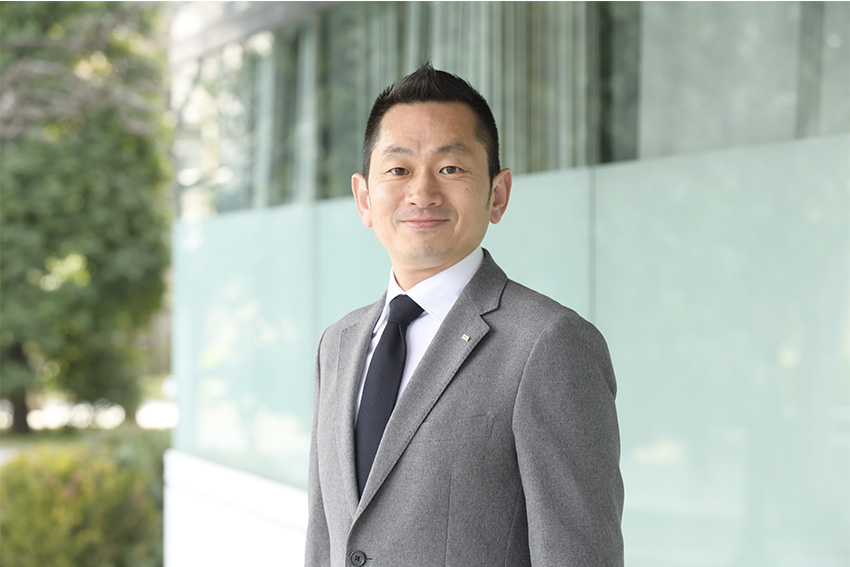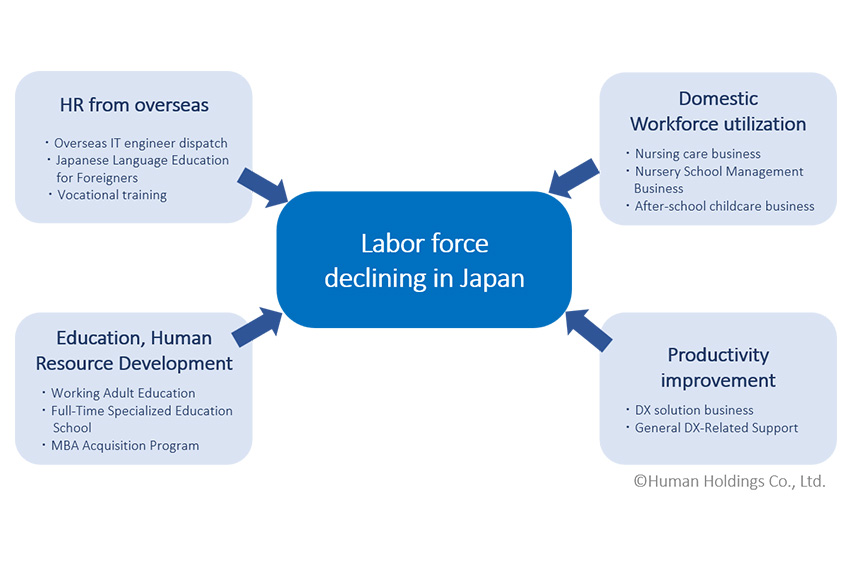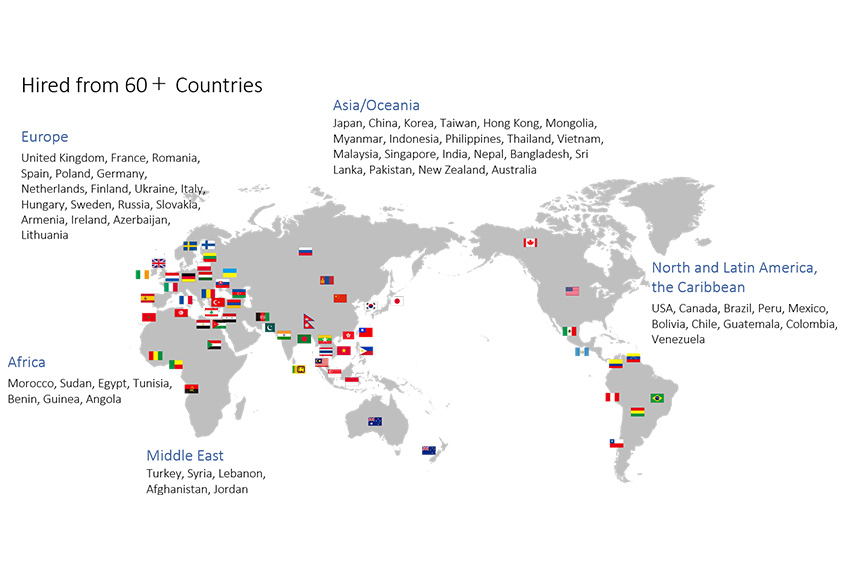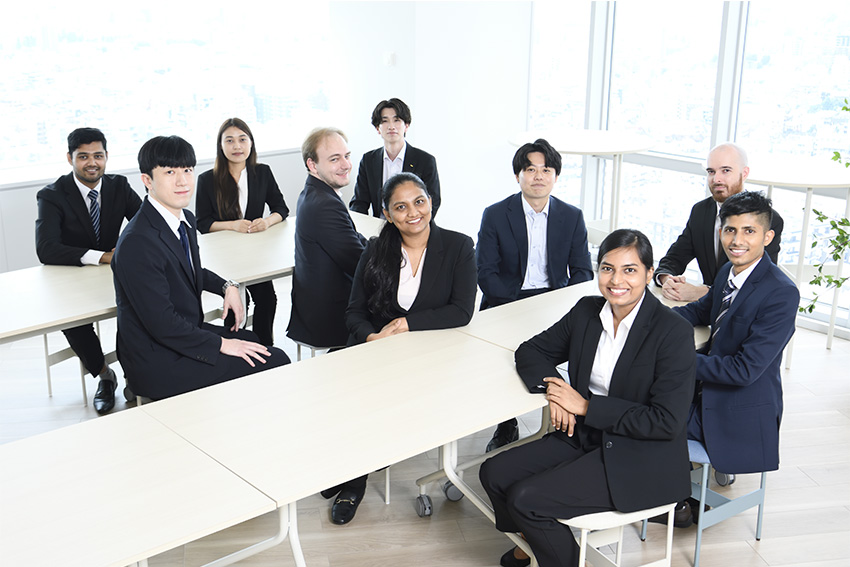Human Resocia is opening the door for highly-skilled engineers from over 60 countries, allowing them to focus on developing skill necessary to tackle Japan's biggest challenges.

Japan is facing significant challenges with its demographic decline and aging population, making it one of the oldest populations in the world—a trend that continues to worsen each year. This situation is placing immense pressure on staffing needs, with estimates suggesting that by 2040, Japan will face a shortage of over 10 million workers. How is this demographic shift impacting your company and the broader industry?
I’m not in a position to speak on behalf of the entire country, but the statistics clearly show how significantly Japan’s demographic pyramid has shifted over the past decade. The demographic decline has created substantial challenges for businesses, particularly in the human resources landscape. These challenges are compounded by related issues, such as the growing skills gap and the shortage of professionally trained individuals who can perform critical jobs onsite.
This is why I want to highlight the core strength of our company: education. Without a focus on education, it would be impossible to address and resolve these challenges now or in the future. The Human Group was established in 1985 with its roots in the education business before expanding into various related fields. From the outset, we recognized the importance of educating people and keeping pace with the new technologies emerging in Japan.
Today, the Human Group offers a diverse range of services, including business schools for working adults, nursing care and childcare training, as well as programs in areas like nail care and sports. By fostering expertise in these and other fields, we aim to promote education and enhance technological skills, empowering individuals to contribute meaningfully to Japan’s workforce.

Medium- to Long-term Priority Areas for the Human Group
As a Human Group, we are approaching a society with a declining workforce from four aspects. The first is the utilization of overseas human resources. We, Human Resocia, hire excellent overseas human resources and supports them to work in Japan. Our group company, Human Academy, has programs and know-how in Japanese language education, so we train people from overseas to have the Japanese language skills necessary to work in Japan.
The second approach is through human resource development and reskilling. As I mentioned earlier, necessary skills change with the times. Therefore, we aim to provide educational programs that match the skills needed today.
The third is to secure labor for “nursing care” and “childcare,” where the supply-demand gap for human resources is already severe and will further widen in the future. These are extremely important fields in Japan's aging society, and are priority targets for our group.
Finally, the environment should be designed to cover the shortage of human resources by improving productivity. One is to automate and save labor for tasks that were previously handled by people. The other is to provide manpower in the form of engineers to support automation. The third is to provide business process outsourcing (BPO) solutions in which we undertake the work itself. By offering these three services, we intend to help companies improve their productivity.
Thus, the Human Group is approaching a society with a declining workforce from four aspects: utilization of overseas human resources, human resource development, securing the domestic workforce, and productivity improvement.
We, Human Resocia, a subsidiary responsible for the group's human resources business, were established in 1988 as a company that supports the employment of those who have studied at Human Academy. Our core businesses are temporary staffing, placement, BPO, overseas engineer dispatching, and DX solution businesses, and our philosophy is to enrich society through the “power of people, education, and technology. “
One of our core businesses, Global IT Talent Service, is a business that recruits talented engineers from overseas to work in Japan, and was launched in 2016. In Japan, there are many people from overseas working in Japan, but most of them are farmers and construction workers. Our GIT service is focused on engineers who can have the most impact on productivity, and our business is focused on IT and construction engineers. We have positioned and focused on GIT services as a growth engine in Human Resocia's business expansion.
Your focus on bringing foreign workers into Japan is fascinating. When you visit Japan, everything feels different—starting with the significant language barrier in Japanese companies, followed by cultural sensitivities and the unique characteristics of Japan’s job market. From the perspective of someone coming to work here, what advantages does your company offer? Additionally, how does your background in education help bridge the gap for potential hires looking to join the Japanese workforce?
As you mentioned, the language barrier is a significant challenge for most people coming to Japan. One of our strengths is our ability to help develop the necessary Japanese language skills through our group’s Human Academy, which provides Japanese language education. While most companies require overseas employees to have passed the top levels (N1 or N2) of the Japanese Language Proficiency Test (JLPT), we are willing to hire individuals with N3 or even N4 levels when they join our company. This is because we provide Japanese language training to help them improve their skills after joining us. Additionally, Japan can be a challenging place for foreigners to navigate. Many face difficulties with basic aspects of life, such as renting apartments, opening bank accounts, or even visiting hospitals. We offer comprehensive support to help them adjust smoothly to life in Japan and overcome these barriers.
Lastly, living abroad can sometimes be isolating, so we take steps to foster community. For example, we hold monthly parties with our team members, providing opportunities to connect with friends and colleagues. Our strength lies not only in matching individuals with job opportunities but also in offering robust support for both Japanese language development and integration into life in Japan.
The skills gap you mentioned is becoming increasingly evident, particularly as certain skills grow scarcer due to a limited and declining talent pool. This challenge is prompting many companies to invest in upskilling and reskilling their workforce. Could you share more about the services your company offers to address this skills gap and prepare the workforce of tomorrow?
Skills gaps are a global issue, not just specific to Japan, and they can vary significantly across industries. Our approach begins by identifying what the individual aspires to become. From there, we focus on providing the training necessary to bridge that gap. We carefully assess and discuss the existing skills gaps and offer tailored training through Human Academy as needed. What sets us apart is our ability to provide not only education but also opportunities to apply the skills acquired through that education. This combination of training and practical application is one of our core strengths.
Your access to the entire corporate structure enables you to offer a unique range of services. One notable shift we’re observing in corporate Japan is the gradual change in the concept of lifelong employment. Today, job-hopping has become somewhat more culturally accepted, and older workers are also exhibiting greater flexibility. What types of opportunities does this cultural shift create for your company and the industry as a whole?
Over the past three decades, the human resources business environment has undergone significant changes. The deregulation of the dispatch staffing market has allowed it to expand into what is now considered a 10 trillion yen industry. Work attitudes among individuals have shifted dramatically, and employers are increasingly recognizing that lifetime employment is not always the optimal solution. For example, an estimated 4.6 million people in Japan now work as freelancers, and there is a growing trend of employees taking on side jobs in addition to their primary roles. Moreover, new forms of employment, such as “spot work,” which involves one-time assignments, are also gaining traction.
In response to these changes, the role of human resources companies is evolving. We are dedicated to helping individuals become the person they aspire to be by offering tailored advice on career paths and providing the educational programs necessary for their personal growth, rather than simply matching them with jobs that meet their immediate requirements. At the Human Group, we have established “SELFing” as our value promise to all stakeholders. SELFing represents the journey of discovering who you want to be and supporting you in achieving that vision. By leveraging the diverse assets of our group, we are committed to empowering individuals to reach their full potential.
The human resources industry is becoming increasingly competitive, but our strength lies in delivering the value of SELFing to each individual, going beyond mere job placement to create meaningful career development opportunities.
Based on what you have said, it seems your firm also has a bigger focus on the individual.
Yes, that’s correct.
You highlighted the importance of DX and AI in automating and enhancing business services. What role do you see DX and AI playing in the future, and what solutions is your company developing to help businesses adopt these technologies effectively?
We are working to make the DX business a core pillar of our operations. Today, while many companies are selling DX solutions and others are actively adopting them, a significant number struggle to effectively use or integrate these tools within their organizations.
Our approach goes beyond simply selling tools. We focus on providing comprehensive support and assistance to ensure these tools are properly utilized and deliver the intended benefits after implementation.
Additionally, many start-up companies are developing excellent DX solutions. While these start-ups excel in product development, some lack the resources to establish robust sales and support departments. Leveraging our proven track record in supporting the adoption of DX solutions, we partner with these companies to provide introduction and implementation support. This partnership model is a key feature of our DX business and reflects our commitment to bridging the gap between innovative solutions and their successful application.

Hired from 60+ countries
One of your key differentiators is the comprehensive set of services you provide. Starting as an education firm, you expanded into recruitment, creating strong synergies between the two. Now, you’re entering the realm of IT and DX services. What do you see as the next step? What other businesses or services do you believe would best complement and synergize with your existing offerings?
In the future, Japan is expected to face a decline in national strength due to its shrinking population. As I mentioned earlier, we at the Human Group are committed to addressing this challenge through four key approaches.
We believe that focusing on industries with significant gaps between the supply and demand of human resources and supporting them in securing talent will contribute to building a more prosperous society. Specifically, we aim to prioritize industries such as construction, healthcare, and IT and telecommunications. Our goal is to provide human resources to these sectors while enhancing productivity through the integration of DX solutions. Education remains a timeless necessity, regardless of the era, and we are determined to keep education at the core of our business as we continue to grow and evolve.
The international job market, particularly in the IT industry, is becoming increasingly competitive, with high demand for skilled professionals. Some companies are addressing this challenge by partnering with institutions such as universities to attract talent. What is your strategy for recruiting top talent, and what role do you see partnerships playing in your future plans?
We believe that partnerships with overseas educational institutions are essential. In our GIT business, we currently recruit talent from 60 countries and collaborate with local partners in each region to support our recruitment efforts. Additionally, we establish partnerships with local universities to attract young graduates, which has been particularly effective in countries like India, where universities play a significant role in nurturing talent.

Global IT Talent "GIT" engineers
You mentioned that you source personnel from over 60 countries. Which countries currently have the highest demand for your services? Additionally, as you look to expand your international network, which countries do you see as offering the greatest opportunities?
We hire from all over the world, regardless of country, but as a percentage,India, with its large population and emphasis on IT education, has the largest percentage. Our group also operates an overseas job site called “Daijob.com,” which serves as a platform for applications and hiring. Essentially, we recruit engineers from all over the world, regardless of their country of origin, as long as they have a desire to work in Japan.
Please imagine that we will come back to interview you again in five years. What ambitions or objectives would you like to have achieved by then?
I believe one of the key indicators that we are providing valuable service and contributing to society is the expansion of our sales. Increasing corporate value through sales growth is crucial for both our customers and employees. It also serves as a clear measure that we are fulfilling our mission and philosophy of supporting the country’s human resource needs.
At the same time, our goal is for clients to view Human Resources as a company that not only provides talent but also nurtures and educates individuals to meet their needs. For job seekers, we want to be recognized as a company that helps them become the person they aspire to be. When we meet again five years from now, I will strive to tell you with confidence that we have truly embodied our mission of “contributing to a better society through our business.”
For more information, please visit their website at: https://gitcareer.resocia.jp/
0 COMMENTS